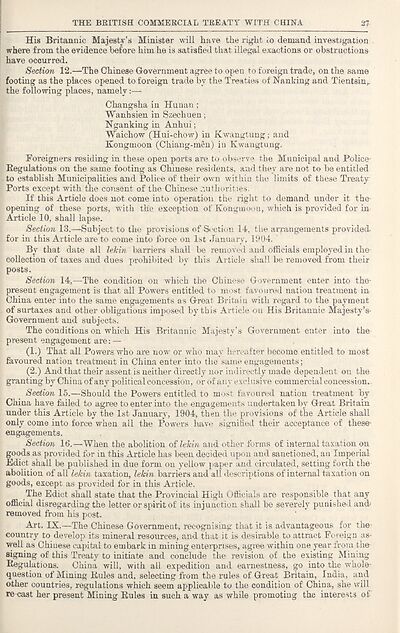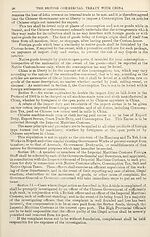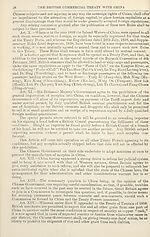1926
(79) Page 27
Download files
Complete book:
Individual page:
Thumbnail gallery: Grid view | List view

THE BRITISH COMMERCIAL TREATY WITH CHINA
27
His Britannic Majesty’s Minister will have the right to demand investigation
where from the evidence before him he is satisfied that illegal exactions or obstructions
have occurred.
Section 12.—The Chinese Government agree to open to foreign trade, on the same
footing as the places opened to foreign trade by the Treaties of Nanking and Tientsin,,
the following places, namely:—
Changsha in Hunan ;
Wanhsien in Szechuen;
Nganking in Anhui;
Waichow (Hui-chow) in Kwangtung; and
Kongmoon (Chiang-men) in Kwangtung.
Foreigners residing in these open ports are to observe the Municipal and Police-
Regulations on the same footing as Chinese residents, and they are not to be entitled
to establish Municipalities and Police of their own within the limits of these Treaty
Ports except with the consent of the Chinese authorities.
If this Article does not come into operation the right to demand under it the-
opening of these ports, with the exception of Kongmoou, which is provided for in
Article 10, shall lapse.
Section 13.—Subject to the provisions of Section 14, the arrangements provided
for in this Article are to come into force on 1st January, 1904.
By that date all lekin barriers shall be removed and officials employed in the
collection of taxes and dues prohibited by this Article shall be removed from their
posts.
Section 14,—The condition on which the Chinese Government enter into the-
present engagement is that all Powers entitled to most favoured nation treatment in
China enter into the same engagements as Great Britain with regard to the payment
of surtaxes and other obligations imposed by this Article on His Britannic Majesty’s-
Government and subjects.
The conditions on which His Britannic Majesty’s Government enter into the
present engagement are: —
(1.) That all Powers who are now or who may hereafter become entitled to most
favoured nation treatment in China enter into the same engagements;
(2.) And that their assent is neither directly nor indirectly made dependent on the
granting by China of any political concession, or of any exclusive commercial concession.
Section 15.—Should the Powers entitled to most favoured nation treatment by
China have failed to agree to enter into the engagements undertaken by Great Britain
under this Article by the 1st January, 1904, then the provisions of the Article shall
only come into force when ail the Powers have signified their acceptance of these-
engagements.
Section 16.—When the abolition of lekin and other forms of internal taxation on
goods as provided for in this Article has been decided upon and sanctioned, an Imperial
Edict shall be published in due form on yellow paper and circulated, setting forth the
abolition of all lekin taxation, lekin barriers and all descriptions of internal taxation on
goods, except as provided for in this Article.
The Edict shall state that the Provincial High Officials are responsible that any
official disregarding the letter or spirit of its injunction shall be severely punished and
removed from his post.
Art. IX.—The Chinese Government, recognising that it is advantageous for the-
country to develop its mineral resources, and that it is desirable to attract Foreign as-
well as Chinese capital to embark in mining enterprises, agree within one year from the
signing of this Treaty to initiate and conclude the revision of the existing Mining
Regulations. China will, with all expedition and earnestness, go into the whole-
question of Mining Rules and, selecting from the rules of Great Britain, India, and
other countries, regulations which seem applicable to the condition of China, she will
re cast her present Mining Rules in such a way as while promoting the interests of
27
His Britannic Majesty’s Minister will have the right to demand investigation
where from the evidence before him he is satisfied that illegal exactions or obstructions
have occurred.
Section 12.—The Chinese Government agree to open to foreign trade, on the same
footing as the places opened to foreign trade by the Treaties of Nanking and Tientsin,,
the following places, namely:—
Changsha in Hunan ;
Wanhsien in Szechuen;
Nganking in Anhui;
Waichow (Hui-chow) in Kwangtung; and
Kongmoon (Chiang-men) in Kwangtung.
Foreigners residing in these open ports are to observe the Municipal and Police-
Regulations on the same footing as Chinese residents, and they are not to be entitled
to establish Municipalities and Police of their own within the limits of these Treaty
Ports except with the consent of the Chinese authorities.
If this Article does not come into operation the right to demand under it the-
opening of these ports, with the exception of Kongmoou, which is provided for in
Article 10, shall lapse.
Section 13.—Subject to the provisions of Section 14, the arrangements provided
for in this Article are to come into force on 1st January, 1904.
By that date all lekin barriers shall be removed and officials employed in the
collection of taxes and dues prohibited by this Article shall be removed from their
posts.
Section 14,—The condition on which the Chinese Government enter into the-
present engagement is that all Powers entitled to most favoured nation treatment in
China enter into the same engagements as Great Britain with regard to the payment
of surtaxes and other obligations imposed by this Article on His Britannic Majesty’s-
Government and subjects.
The conditions on which His Britannic Majesty’s Government enter into the
present engagement are: —
(1.) That all Powers who are now or who may hereafter become entitled to most
favoured nation treatment in China enter into the same engagements;
(2.) And that their assent is neither directly nor indirectly made dependent on the
granting by China of any political concession, or of any exclusive commercial concession.
Section 15.—Should the Powers entitled to most favoured nation treatment by
China have failed to agree to enter into the engagements undertaken by Great Britain
under this Article by the 1st January, 1904, then the provisions of the Article shall
only come into force when ail the Powers have signified their acceptance of these-
engagements.
Section 16.—When the abolition of lekin and other forms of internal taxation on
goods as provided for in this Article has been decided upon and sanctioned, an Imperial
Edict shall be published in due form on yellow paper and circulated, setting forth the
abolition of all lekin taxation, lekin barriers and all descriptions of internal taxation on
goods, except as provided for in this Article.
The Edict shall state that the Provincial High Officials are responsible that any
official disregarding the letter or spirit of its injunction shall be severely punished and
removed from his post.
Art. IX.—The Chinese Government, recognising that it is advantageous for the-
country to develop its mineral resources, and that it is desirable to attract Foreign as-
well as Chinese capital to embark in mining enterprises, agree within one year from the
signing of this Treaty to initiate and conclude the revision of the existing Mining
Regulations. China will, with all expedition and earnestness, go into the whole-
question of Mining Rules and, selecting from the rules of Great Britain, India, and
other countries, regulations which seem applicable to the condition of China, she will
re cast her present Mining Rules in such a way as while promoting the interests of
Set display mode to:
![]() Universal Viewer |
Universal Viewer | ![]() Mirador |
Large image | Transcription
Mirador |
Large image | Transcription
Images and transcriptions on this page, including medium image downloads, may be used under the Creative Commons Attribution 4.0 International Licence unless otherwise stated. ![]()
| Asian directories and chronicles > 1926 > (79) Page 27 |
|---|
| Permanent URL | https://digital.nls.uk/196489200 |
|---|
| Attribution and copyright: |
|
|---|---|
| Description | Volumes from the Asian 'Directory and Chronicle' series covering 1917-1941, but missing 1919 and 1923. Compiled annually from a multiplicity of local sources and research. They provide listings of each country's active corporations, foreign residents and government agencies of all nationalities for that year, together with their addresses. Content includes: various treaties; coverage of conflicts; currencies and taxes; consular fees; weights and measures; public holidays; festivals and traditions. A source of information for both Western states and communities of foreigners living in Asia. Published by Hongkong Daily Press. |
|---|---|
| Shelfmark | H3.86.1303 |
| Additional NLS resources: |

